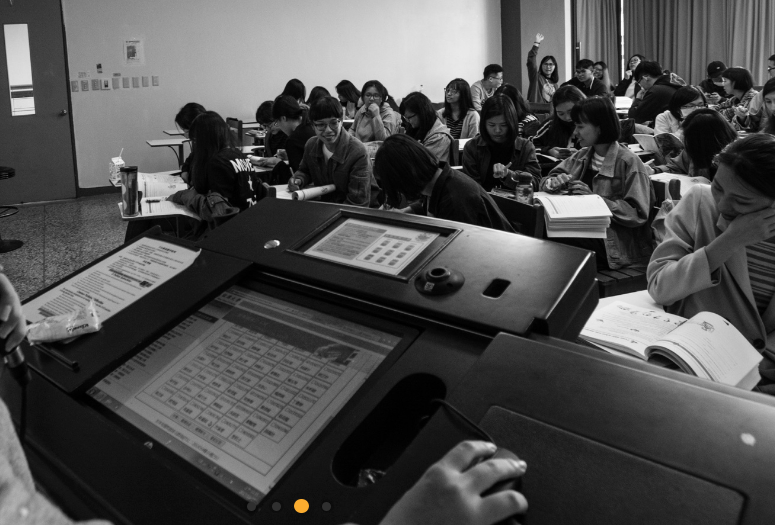高教工會銘傳分部推選英語教學中心Clifton Hoyt教授為召集人
雖然《工會法》自2010年起,廢除了過去規範僅具中國民國國籍身分始得擔任工會理、監事幹部等職務的規定[1],然而,台灣至今以本國籍勞工占會員絕大多數的工會組織內,外籍人士擔任工會幹部之案例,仍是少之又少。其中,人數逾三萬人、由台灣各公司或機構所聘僱的「外國專業人員」[2]中,加入工會、甚至擔任工會幹部者,更是罕見。上個(七)月17日,台灣高等教育產業工會在銘傳大學的教職員會員努力下,正式成立「高教工會銘傳大學分部」。工會銘傳分部為台灣第一個以外籍教師占多數為主體所建立的工會分部,會員分別來自多個不同國家,也為目前台灣大專院校約1000名外籍教師首開先例。籌備成立會議中,共同推選英語教學中心(English Language Center, ELC)專任教師 - 賀禮夫(Dr. Clifton Hoyt)出任工會分部召集人。
-300x202.jpg) 目前為銘傳大學英語教學中心專任助理教授的賀禮夫,來台授課、定居已經長達13年,熱愛在台灣教學與生活的賀禮夫,也因為同時擁有法律與英文的博士學位(愛爾蘭都柏林大學三一學院英文博士、美國緬因大學法律博士),以及其在銘傳大學傑出的專業教學表現,拿到了台灣政府內政部自2009年起才開始核發的「高級專業人才永久居留卡」(俗稱「梅花卡」),此制度上路至今10年僅168位外籍專業人士取得。賀禮夫表示:拿到台灣政府所核發的永久居留證「梅花卡」,以及日前被推選為工會銘傳分部召集人,可以說是他來到台灣13年來,最感到榮耀的兩件事。
目前為銘傳大學英語教學中心專任助理教授的賀禮夫,來台授課、定居已經長達13年,熱愛在台灣教學與生活的賀禮夫,也因為同時擁有法律與英文的博士學位(愛爾蘭都柏林大學三一學院英文博士、美國緬因大學法律博士),以及其在銘傳大學傑出的專業教學表現,拿到了台灣政府內政部自2009年起才開始核發的「高級專業人才永久居留卡」(俗稱「梅花卡」),此制度上路至今10年僅168位外籍專業人士取得。賀禮夫表示:拿到台灣政府所核發的永久居留證「梅花卡」,以及日前被推選為工會銘傳分部召集人,可以說是他來到台灣13年來,最感到榮耀的兩件事。
高教工會說明,過去幾個月來,銘傳大學多數外籍教師紛紛加入工會並進一步促成了工會分部成立的原因,在於許多來到台灣定居並在銘傳大學任教,有著長期且豐富英語教學經驗的外籍教師們,熱愛在台灣的生活、更願意持續在台灣貢獻所長,培育更多的台灣大學生英語能力;而過去很長一段時間,在台灣高等教育內有著良好口碑,以嚴謹訓練聞名、設計讓學生大一至大四皆需修習英語的銘傳大學,卻出現中心組織將進一步變動或調整的傳聞。
考量到組織變動之不確定性,同時擔憂將因此影響到學生受教品質與外籍教師工作權與勞動權益,銘傳大學英語教學中心的多數外籍教師們,紛紛加入高教工會,並以最快速度成立了工會銘傳分部,期望藉此與銘傳大學校方、英語教學中心管理層,在台灣《工會法》、《團體協約法》等法令保障下,建立起良性的勞資互動、協商機制。高教工會日前也已經依據《團體協約法》,正式向銘傳大學校方與英語教學中心提出進行勞資協商的要求,目前靜待銘傳大學校方的進一步回應。
高教工會也表示:雖然分部建立之初以外籍教師為主要成員,將持續擴大招募銘傳大學校內教職員會員,並提供加入之會員更完整的法令規範與權益保障之解析、諮詢及相關協助。工會敬邀每一位銘傳大學的教師與職員們踴躍加入工會、參與分部運作,確保自身勞動權益與工作權,並一同促進銘傳校園內民主討論與決策以及訊息透明機制的建立。
[1] 《工會法》2010年6月1日修法前,於第十六條 「工會理監事之資格」中特別限定:「工會會員具有中華民國國籍而年滿二十歲者,得被選為工會之理事、監事。」
[2] 根據勞動部勞動力發展署統計,至2019年6月底來台工作之「外國專業人員」有效聘僱許可人數為31,407人。
If We Join and Act Together, it is Hard to Imagine How Bright the Future Might Be.
By Clifton Hoyt, PhD
President, Ming Chuan Branch, Taiwan Higher Education Union
Two of the proudest moments in my life have been since I first came to Taiwan almost 13 years ago. First, I was granted permanent residence via the VIP residence certificate called the 梅花卡 in recognition of my expertise in legal English resulting from having doctoral degrees in both English and Law (PhD in English, Trinity College Dublin, Ireland and JD in Law, University of Maine).
Equally proud a moment occurred just this past 17 July, when I was unanimously elected president (召集人) of the newly-formed Ming Chuan University with well over half of the union members attending or voting by proxy. I’m deeply moved by the trust my colleagues have placed in me.
Many of us have for some time been concerned about trends at Ming Chuan, as well as other private and public universities. The ultimate and worthy purpose of any university, public or private, is to raise the level of knowledge and education of the people of Taiwan, and it is to fulfill that purpose that I was so welcomed here some 13 years ago. The stakeholders in universities like Ming Chuan include not only those who have in some cases dedicated entire working lives to that worthy purpose, but also students who stake their future working lives by enrolling here, as well as parents who likewise entrust the futures of their families.
Actually, the stakeholders include all of the people of Taiwan. Their tax money is entrusted to universities by the Ministry of Education to further that purpose, and the money so entrusted makes up much of the funding for universities such as Ming Chuan.
But this—the fact that all of us are stakeholders who have a right to be heard— is often overlooked.
Over the years, changes at Ming Chuan have disturbed and worried many teachers here. These changes so often seemed to cheapen the students’ education. Recently, we became so concerned, not only for our own futures but also for the erosion of the ideals Ming Chuan has historically stood for, that we could no longer remain complacent. Beginning with hushed and furtive conversations, we sought out like-minded colleagues and some means to act together.
We quickly grew—in confidence, strength, and numbers—until a majority of faculty at Ming Chuan’s English Language Center were members of the Taiwan Higher Education Union. That means that Ming Chuan is now legally required, under the Labor Union Act (as amended 2016) to include the Union in future negotiations. Once this was officially announced on June 4th, Union numbers have surged, including people from other department (and staff members, part-timers etc.) joining or inquiring.
Which is as it should be. “Union,” after all, means making one big thing out of many small things. Isolated and terrified individuals cannot imagine any very bright future. But if we join and act together, it is hard to imagine how bright our future might be. Union membership isn’t just for professors or instructors or secretaries: anyone who gets a paycheck from Ming Chuan, no matter how small, can join. Also, any student enrolled in Ming Chuan can also join (and of course they pay less). And there is also an affiliated union that parents of Ming Chuan students can join.

